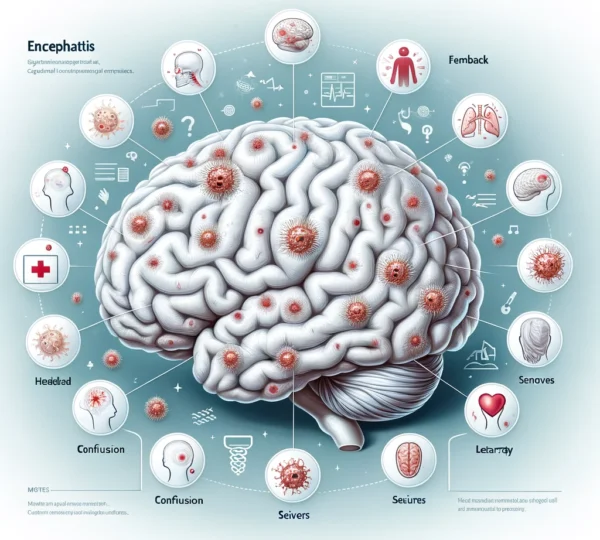Understanding Encephalitis: Causes, Symptoms, and Treatment
Introduction
Encephalitis is a severe inflammation of the brain that can be caused by viruses, bacteria, or other organisms. This condition can lead to serious complications and can be life-threatening if not addressed promptly. Early diagnosis and treatment can significantly increase the chances of recovery and reduce the risk of long-term effects. In this article, we will explore the various aspects of encephalitis, including its causes, symptoms, diagnosis, treatment options, and prognosis.
Symptoms of Encephalitis
The symptoms of encephalitis can vary depending on the underlying cause, but they typically include a combination of the following:
- Fever: A high body temperature is one of the first noticeable symptoms of encephalitis. This fever may be accompanied by chills as the body attempts to fight off the infection.
online pharmacy buy stendra with best prices today in the USA
- Headache: Severe headaches are often experienced by individuals with encephalitis, sometimes described as the worst headache of their life.
- Seizures: Some individuals with encephalitis may have seizures, which can range from mild to severe and require immediate medical attention.
- Confusion: Feelings of confusion or disorientation are common symptoms. Individuals may have difficulty concentrating or may not understand their surroundings.
- Nausea and Vomiting: Many individuals with encephalitis experience gastrointestinal symptoms, including nausea and vomiting, which can further complicate their condition.
- Sleepiness: Encephalitis can cause extreme drowsiness or lethargy, and in severe cases, individuals may slip into a coma. This symptom highlights the seriousness of the condition and the need for immediate medical evaluation.
Causes of Encephalitis
Encephalitis can arise from various infectious agents, including:
- Viruses: The most common viral causes of encephalitis include herpes simplex virus (HSV), mumps virus, West Nile virus, and enteroviruses. Each virus can lead to different clinical presentations and outcomes.
- Bacteria: Bacterial infections like Lyme disease, tuberculosis, and syphilis can also cause encephalitis. These conditions may result from infections that spread to the central nervous system (CNS).
- Other Organisms: Encephalitis can also result from parasitic infections, such as those caused by Toxoplasma gondii, or fungal infections like Cryptococcus. These types of infections often affect individuals with compromised immune systems.
Diagnosis of Encephalitis
Diagnosing encephalitis requires a comprehensive approach, which may include:
- Physical Examination: Healthcare providers will conduct a thorough physical examination to assess symptoms and overall health.
- Medical History Review: Discussing recent infections, travel history, and vaccination status can provide critical clues regarding the cause of encephalitis.
- Diagnostic Tests: Specific tests are crucial for an accurate diagnosis. These may include:
- Lumbar Puncture (Spinal Tap): This test involves extracting cerebrospinal fluid (CSF) to analyze for signs of infection or inflammation.
- Magnetic Resonance Imaging (MRI): An MRI scan can help visualize the brain and identify areas of inflammation, lesions, or other abnormalities.
- Blood Tests: These tests can check for the presence of viruses or bacteria in the bloodstream.
Treatment Options for Encephalitis
The treatment for encephalitis varies based on its cause:
- Viral Encephalitis: If a virus causes the condition, healthcare providers may prescribe antiviral medications, such as acyclovir for herpes simplex virus infections. These medications can help reduce the severity of symptoms and improve recovery.
buy stromectol online http://edlaboratories.com/tour/edl-glio/swf/stromectol.html no prescription pharmacyonline pharmacy buy elavil with best prices today in the USA
- Bacterial Encephalitis: In cases where bacteria cause encephalitis, antibiotics will be necessary to combat the infection. Prompt treatment is critical to prevent complications.
- Supportive Care: Regardless of the cause, individuals with encephalitis often require supportive care. This may include:
- Pain Management: Administering medications to relieve headaches and body aches.
- Hydration: Ensuring proper hydration, either orally or through intravenous fluids, to prevent dehydration.
- Monitoring: Continuous monitoring in a hospital setting may be necessary for severe cases to manage complications and ensure safety.
Prognosis for Encephalitis
The prognosis of encephalitis varies widely and depends on several factors, including:
- Cause of Encephalitis: Viral encephalitis may have a better prognosis than bacterial encephalitis, which can lead to more severe complications.
- Severity of Symptoms: Individuals who present with severe symptoms, such as seizures or coma, may face a higher risk of long-term effects.
- Timeliness of Treatment: Early diagnosis and prompt treatment significantly improve recovery chances. Most individuals can recover completely, but some may experience residual symptoms, such as memory problems or neurological deficits.
Conclusion
Encephalitis is a serious condition that requires immediate medical attention. Recognizing the symptoms early and seeking prompt treatment can dramatically improve outcomes and reduce the risk of complications.
If you or someone you know experiences symptoms associated with encephalitis, do not hesitate to seek medical help.
Understanding the causes, symptoms, and treatment options empowers individuals to take proactive steps toward their health.
For More Information Click here



